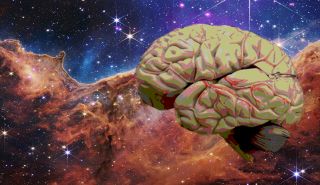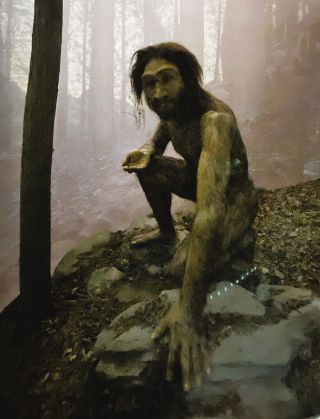Cognition
Confronting the Confounding Cosmic Mind of Homo Sapiens
Personal Perspective: Pondering our paradoxical brain.
Posted December 16, 2022 Reviewed by Ekua Hagan
Key points
- A spectrum of both genius and stupidity now flows from eight billion human minds, which evolutionarily were not designed for modern life.
- Neither high intelligence nor advanced education guarantees anyone protection from irrational thinking and the lure of absurd beliefs.
- The solution to bad thinking is good thinking in the form of constructive skepticism and the consistent application of critical thinking skills.

These are strange times for the supremely bright and most nonsensical lifeform on Earth. Even as our knowledge swells exponentially and we think our way deeper into the universe’s most challenging mysteries, we somehow balance all of it with stellar stupidity. Medical quackery sells as if that thing called science never happened. Conspiratorial craziness surfs a perfect wave called the internet. Millions hail imbeciles as political saviors and venerate deranged celebrities.
Objectivity is difficult at ground zero, but the human mind does seem to be accelerating on two diverging tracks. It’s as if a race between human genius and the village idiot has gone supersonic. Perhaps there can never be a winner because nature doomed us to be as senseless as we are smart. Or maybe we are only a few societal tweaks away from intellectual elevation. Who can say? For basic self-awareness, however, it is important that we at least acknowledge the opposing extremes to which our thoughts now carry us. Confronting this problem might even inspire, or shame, more of us to want to do better.
First, we must reject the common belief that our cognitive crisis is about dim people vs. bright people or the educated vs. the uneducated. If only it were that simple. To varying degrees, the problem is everywhere because all minds are prone to daily bouts of perfect clarity and self-inflicted folly. Misperceptions and muddled assumptions are standard features of the human condition. Even the best of us are clever and gullible throughout life, often from one moment to the next. We all believe silly things, what matters is how many and how silly.
Humankind is unique, the impossible species simultaneously worthy of awe, applause, tears, and ridicule. So aware and so lost, we are the bipedal paradox, the big-brained airheads. How can one lifeform be this empowered by intelligence and so crippled by self-inflicted folly? In our defense, we are not the first wave of high-functioning clowns. But how far back must one go to land on a time in which the hordes of humanity were not stumbling over their fantasies? All the way, probably. Maybe one of the first humans was also the last rational human. I can imagine such a person, living a million years or so ago in the form of Homo erectus. Perhaps she or he was too focused on perfecting an Acheulean handaxe and feeding a fragile fire to entertain a long list of confusions and delusions of the sort that cloud our minds today.

The bulging and bustling brain of the typical 21st-century human is so busy with irrational intuitions, baseless fears, hopeless hopes, and distorted observations that it’s a miracle we get anything done. But somehow, we do. Images from the James Webb Space Telescope prove that we are a spectacular lifeform, perhaps even worthy of that Linnaean label “Wise Man." We explore the very large, the very small, and everything in between. We contemplate the substance of “nothing” and wonder if there might be universes beyond our own. Who but us would dare to think about a time before time and then attempt to capture it with mathematics? This year we reached out into space and altered the course of a speeding asteroid, an ability that may save our world one day (NASA 2022). Let’s hope we can save ourselves by altering the course of the speeding madness within, too.
The nature of our inherited brain
Why are we like this? How did we end up with both astronomy and astrology books in our libraries? Look to the past for the answer. The brain we inherited is evolution’s most magnificent disaster. It’s a potent arsenal of analytical powers and a cesspool of infinite foolishness. Our brain evolved to creatively navigate prehistoric Africa, not the mental menageries of this modern life. Priority one was once clear: Stay alive long enough to find the next meal and next mate. But the game changed, and our brains failed to keep up. We do not instinctively or naturally respond well to many of today’s routine challenges. Determining the validity of social media posts, deciphering deceptive advertisements, and judging the competence of politicians requires deliberate and conscious critical thinking. Alas, modern people are just not that good at modern thinking.
I am not anti-human. Some of my best friends are people. However, we cannot excuse the spectrum of pathetic and troublesome thoughts now flowing from 8 billion brains without much in the way of guardrails. Inanity is an unfortunate consequence of the brain’s greatest feature. We generate new ideas and tackle extraordinary concepts because our brains are animated blobs of shifting structures. Dense rainforests of neural networks in constant flux can produce everything from poetry to space telescopes. This is a good thing, of course, except when it’s not. Unfortunately, the brain’s remarkable plasticity also burdens us with the potential to believe anything, no matter how ridiculous or dangerous.
Remember the James Webb Space Telescope images I mentioned? Around the same time that millions were celebrating the opening of this new portal into deep space, USA Today felt it necessary to publish a fact-checking article to reassure people that the Large Hadron Collider in Switzerland was not going to open a portal into hell (Sudiksha 2022). Use your mighty neocortex to ponder this singular near-perfect illustration of who we are. Homo sapiens is what happens when inspired intelligence and enthusiastic stupidity agree to be roommates. No matter how high humanity soars—investigating the external universe around us or the internal universe of an atom—our brain termites come along for the ride, too.
The need for good thinking
It is uncertain if civilization can survive indefinitely with the current operating system. We may think ourselves all the way to the elimination of poverty, war, and disease. Or, like Slim Pickens on an A-bomb, we might ride imaginary demons all the way to ruin. The necessary hope is that enough of us at some point soon will decide to put more thought into our thoughts, thereby sparing the species cerebral suicide. Can we achieve a collective cognitive upgrade and become a more rational species before we eat our own tail? This may be the most important question we ever answer.
It is always a good time for good thinking. Please strive to stand on the correct side of this fault line because every committed good thinker helps nudge our species in the general direction of sanity and sustainability. Think well and think often. Homo sapiens needs you.
References
NASA. 2022. NASA’s DART Mission Hits Asteroid in First-Ever Planetary Defense Test. (September 26). Available online at https://www.nasa.gov/press-release/nasa-s-dart-mission-hits-asteroid-in-first-ever-planetary-defense-test.
Kochi, Sudiksha. 2022. Fact check: Scientists at CERN are not opening a 'portal to hell'. USA TODAY (July 26). Available online at https://www.usatoday.com/story/news/factcheck/2022/07/26/fact-check-scientists-cern-not-opening-portal-hell/10094679002/.




